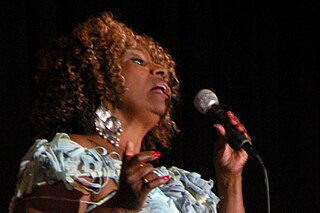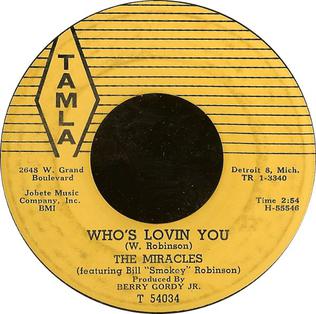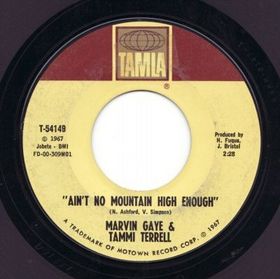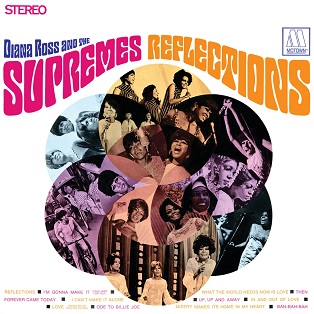Related Research Articles

Mary Esther Wells was an American singer, who helped to define the emerging sound of Motown in the early 1960s.

"Someday We'll Be Together" is a song written by Johnny Bristol, Jackey Beavers, and Harvey Fuqua. It was the last of twelve American number-one pop singles for Diana Ross & the Supremes on the Motown label. Although it was released as the final Supremes song featuring Diana Ross, who left the group for a solo career in January 1970, it was recorded as Ross' first solo single and Supremes members Mary Wilson and Cindy Birdsong do not sing on the recording. Both appear on the B-side, "He's My Sunny Boy".

Brenda Holloway is an American singer and songwriter, who was a recording artist for Motown Records during the 1960s. Her best-known recordings are the soul hits, "Every Little Bit Hurts", "When I'm Gone", and "You've Made Me So Very Happy." The latter, which she co-wrote, was later widely popularized when it became a Top Ten hit for Blood, Sweat & Tears. She left Motown after four years, at the age of 22, and largely retired from the music industry until the 1990s, after her recordings had become popular on the British "Northern soul" scene.

"Who's Lovin' You" is a Motown soul song, written in 1960 by William "Smokey" Robinson. The song has been recorded by many different artists including The Miracles, who recorded the 1960 original version, The Temptations, The Supremes, Terence Trent D'arby, Brenda and The Tabulations, John Farnham, Human Nature, En Vogue, Michael Bublé and Giorgia Todrani and Jessica Mauboy. The most famous version is attributed to The Jackson 5. Shaheen Jafargholi, then twelve years old, performed the song at Michael Jackson's public memorial service in July 2009.

"Ain't No Mountain High Enough" is a song written by Nickolas Ashford & Valerie Simpson in 1966 for the Tamla label, a division of Motown. The composition was first successful as a 1967 hit single recorded by Marvin Gaye and Tammi Terrell, and became a hit again in 1970 when recorded by former Supremes frontwoman Diana Ross. The song became Ross's first solo number-one hit on the Billboard Hot 100 chart and was nominated for the Grammy Award for Best Female Pop Vocal Performance.

"My Guy" is a 1964 hit single by Mary Wells for the Motown label. Written and produced by Smokey Robinson of The Miracles, the song is a woman's rejection of a sexual advance and affirmation of her fidelity to her boyfriend, who is her ideal and with whom she is happy, despite his ordinary physique and looks.

Love Child is the fifteenth studio album released by Diana Ross & the Supremes for the Motown label in 1968. The LP was the group's first studio LP not to include any songs written or produced by any member of the Holland–Dozier–Holland production team, who had previously overseen most of the Supremes' releases.

Reflections is the twelfth studio album recorded for Motown by Diana Ross & the Supremes. Released in 1968, it was the first regular studio LP to display the new billing of the group formerly known as "The Supremes." It contains the singles "Reflections", "In and Out of Love" and "Forever Came Today". Also included are covers of songs made famous by Martha and the Vandellas and The 5th Dimension. Also present are songs written by other famous names, including "Bah-Bah-Bah" co-written by Motown singer Brenda Holloway with her younger sister, Patrice, an original Smokey Robinson composition titled "Then", and "What the World Needs Now Is Love" by Burt Bacharach and Hal David, which Motown planned to release as a single in the spring of 1968, but cancelled. It also contains a cover of Bobbie Gentry's "Ode to Billie Joe," whose original recording kept the single #2 "Reflections" from peaking at the top spot on the Billboard Hot 100 in September 1967, and it hit #2 on Cashbox.

"Jimmy Mack" is a pop/soul song that in 1967 became a hit single by Martha and the Vandellas for Motown's Gordy imprint. Written and produced by Motown's main creative team, Holland–Dozier–Holland, "Jimmy Mack" was the final Top 10 pop hit for the Vandellas in the United States, peaking at number 10 on the Billboard Hot 100 in 1967 and at number-one on the Billboard R&B Singles chart. Billboard named the song #82 on their list of 100 Greatest Girl Group Songs of All Time.

Meet the Supremes is the debut studio album by The Supremes, released in late 1962 on Motown.

Hi... We're the Miracles is the first album by The Miracles, Motown's first group, released on Motown's Tamla subsidiary label in the summer of 1961. It was the first album released by the Motown Record Corporation. The album features several songs that played an important role in defining The Motown Sound and establishing songwriters Smokey Robinson and Berry Gordy.

"Your Heart Belongs to Me" is a 1962 song written and composed by The Miracles' William "Smokey" Robinson and released as a single by Motown singing group The Supremes during their early years with the label. The song is about a woman whose lover is in the armed forces and has "Gone to a far-away land"; its narration has her tell him to always remember their love for each other if he ever gets lonely.
"A Breathtaking Guy" is a 1963 song written and produced by Smokey Robinson and released first by Motown singing group The Supremes (1963) and later by The Marvelettes (1972). The single was originally released under the title "A Breath Taking, First Sight Soul Shaking, One Night Love Making, Next Day Heartbreaking Guy" by The Supremes, but was shortened after its official release. All three Supremes members - Diana Ross, Florence Ballard and Mary Wilson - sang the chorus with the original title together.

"You've Made Me So Very Happy" is a song written by Brenda Holloway, Patrice Holloway, Frank Wilson and Berry Gordy, and was released first as a single in 1967 by Brenda Holloway on the Tamla label. The song was later a huge hit for jazz-rock band Blood, Sweat & Tears in 1969, and became a Gold record.
"Laughing Boy" is a song written and produced by Smokey Robinson and recorded and released as a single by early Motown star Mary Wells in 1963. The single is notable for being the song to break a consecutive streak of top ten hits Wells had scored between mid-1962 and early-1963.

Two Lovers and Other Great Hits is an album released by Motown singer Mary Wells, the third album she released while recording for the label. It debuted on the Billboard album chart March 16, 1963 reaching #49, remaining on the chart for eight weeks. The album composed of Wells' third top ten hit, "Two Lovers", the follow-up hit, "Laughing Boy" and the b-side to the "Two Lovers" single, "Operator", the latter song later re-recorded as a minor hit for fellow Motown female crooner, Brenda Holloway.
"Operator" is a Motown song recorded by Motown vocalists Mary Wells and Brenda Holloway. The Wells version was the b-side to her top ten hit, "Two Lovers" while Holloway's was issued as a single in 1965.
"Strange Love" is a song that was issued as the third single by Motown singer Mary Wells. The song would be later issued on Wells' second album, The One Who Really Loves You.

"I'll Try Something New" is a song written by Smokey Robinson and originally released in 1962 by The Miracles on Motown Records' Tamla subsidiary label. Their version was a Billboard Top 40 hit, peaking at #39, and just missed the Top 10 of its R&B chart, peaking at #11. The song was released later as a joint single by Diana Ross & the Supremes and The Temptations, also becoming a charting version on the Billboard 100 pop singles chart, peaking for two weeks in April 1969 at number 25.
"Way Over There" is a 1960 Motown soul song and single, written by William "Smokey" Robinson, produced by Berry Gordy, and first performed by The Miracles for the Tamla (Motown) label. It was one of The Miracles' earliest charting singles, reaching #94 on the Billboard Pop chart. Motown president Berry Gordy, Jr. had The Miracles record the song several times during its chart run. The first version had minimal orchestration. The second version added strings, and this is the version played by most oldies stations today. Claudette Robinson had several lead parts on this song, answering Smokey's leads with chants of "Come to me, Baby". The song's B-side, "(You Can) Depend on Me", while not charting nationally, did become a popular regional hit in many areas of the country, and Smokey still sings it in his live shows today. "Way Over There" has inspired cover versions by Edwin Starr, The Temptations, The Marvelettes, The Royal Counts, The Spitballs, and Eddie Adams Jr, while "(You Can) Depend on Me" has inspired cover versions by The Temptations, The Supremes, Mary Wells, and Brenda Holloway. The song was also used for the title of Hip-O Select's 2009 compilation: The Miracles – Depend on Me: The Early Albums, which collects the first five LP releases by the group.
References
- 1 2 The Complete Motown Singles Vol 4: 1964 [CD liner notes]. New York: Hip-O Select/Motown/Universal Records.
- ↑ The Complete Motown Singles Vol 5: 1965 [CD liner notes]. New York: Hip-O Select/Motown/Universal Records.
- ↑ When I'm Gone at AllMusic
- ↑ Whitburn, Joel (2004). The Billboard Book of Top 40 Hits, 8th Edition (Billboard Publications), page 289.
- ↑ "Top RPM Singles: Issue 5672." RPM . Library and Archives Canada.
- ↑ "Brenda Holloway Chart History (Hot 100)". Billboard.
- ↑ "Brenda Holloway Chart History (Hot R&B/Hip-Hop Songs)". Billboard.
- ↑ "TOP R&B SINGLES OF 1965 (Ratings are based on chart action from Jan. 30 to Oct. 30.)" (PDF). Billboard . p. 40. Retrieved January 14, 2022– via worldradiohistory.com.